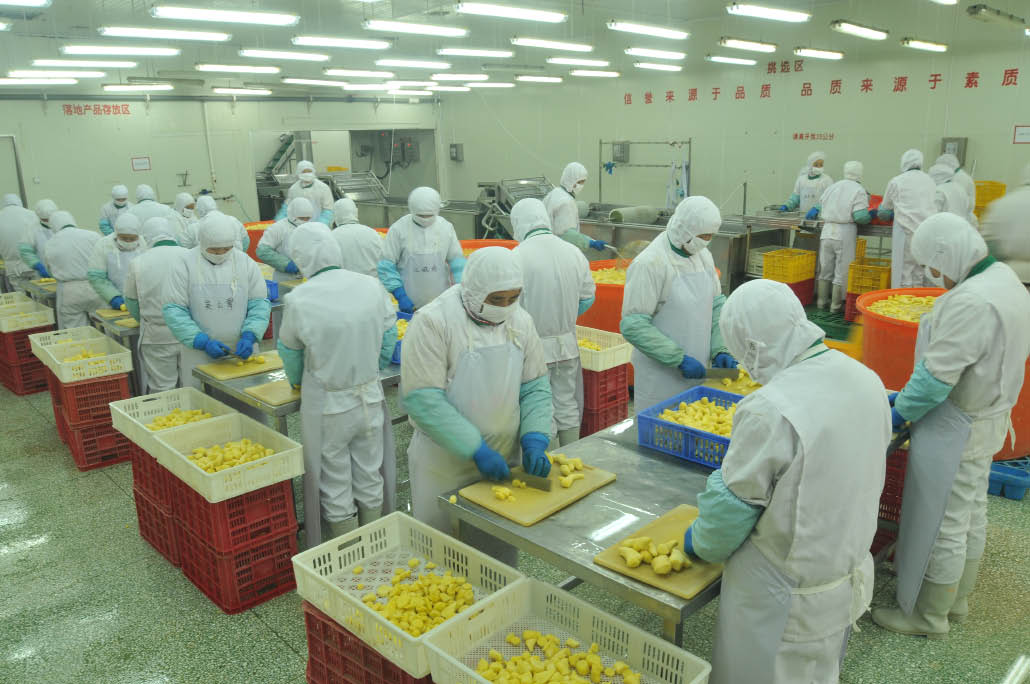| When China's Agricultural Exports Meet Green Barriers
By staff reporter LI YUAN
ON June 25 last year, officials from African countries visited Anqiu City in Shandong Province to inspect the quality and safety management of local agricultural products.
Located in the central Shandong Peninsula, Anqiu has over 86,700 hectares of prime arable land. Its major agricultural products are peanuts, fruits and vegetables. Agricultural exports are the lifeblood of the city’s economy.
 |
| Employees process ginger at Weifang Xinsheng Food Co., Ltd. |
Entering Foreign Markets
Liu Shili is a farmer in Qianrulinzhuang Village of Linghe Town in Anqiu City. In 1998, he established Weifang Xinsheng Food Co., Ltd., which became the first local enterprise to export processed agricultural produce.
“At that time we only exported fresh vegetables such as ginger and Chinese onion. All the processing we did was to peel the onions and remove the mud from the ginger,” Liu said.
Despite its modest size, Liu’s company paved the way for local farm produce to reach international markets. It earned coveted foreign exchange for the local government, created employment in job-starved rural towns and bolstered prices for agricultural products in the region.
In 2001, China joined the World Trade Organization (WTO). Though China’s accession was celebrated nationwide, there was widespread concern about the fate of farmers and agriculture in the face of stiff international competition. Many worried the country’s agricultural industry was insufficiently modernized in terms of production modes, technology and marketing, and that foreign competition could spell ruin for domestic players. Indeed, agriculture was one of the most contended topics in the negotiation process to join the international trade body.
WTO advocates have, however, been justified in their initial optimism over the last decade. According to recent statistics, with China’s entry to the WTO and the corresponding greater opening up of its domestic market, the country’s total agricultural trade increased from US $27.92 billion in 2001 to US $121.96 billion in 2010, or by a factor of 3.4. Imports shot up from US $11.85 billion to US $72.55 billion – an average annual increase of 22.3 percent - and export earnings grew from US $16.07 billion to US $49.41 billion at an annual pace of 13.3 percent.
According to the Ministry of Agriculture, China’s exports of farm products are mainly fruits, vegetables and lightly processed food items, whose production is labor intensive. Agricultural imports are largely land-intensive items such as oilseed crops and cotton. Exports have helped boost food processing, which increases the added value on farm goods, have optimized the structure of China’s agricultural industry, and increased rural employment and income for farmers. Greater imports of land-intensive products have sated soaring demand and alleviated pressure on domestic resources and the environment.
“China’s entry to the WTO has direct impact on the structure and volume of China’s agricultural trade. Imports of land- and water-intensive products and exports of labor-intensive products have increased rapidly, and this is in line with China’s strengths and weaknesses in agriculture. Such a trend was perhaps inevitable, but the WTO has certainly hastened the pace of change,” said Zhong Funing, a professor at Nanjing Agricultural University and a consultant to the United Nations’ Food and Agriculture Organization.
In 2002, barely a year after China joined the WTO, Liu Shili set up a new factory in Anqiu to meet growing orders from abroad. His company now grows and processes crops on its farms and sells them globally. Liu has 650 permanent employees in addition to 2,500 part-time workers in peak seasons. Its annual production volume tops 40,000 tons, and its products boast accreditation from the Global G.A.P., the Japanese Agriculture Standard, Tesco Nature’s Choice and the Ethical Trade Initiative. Its products are sold in Japan, the U.S., the E.U., Southeast Asia and a number of other regions around the globe.
| 